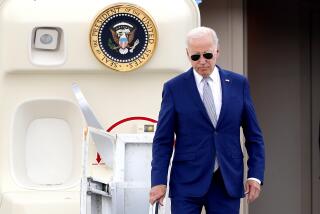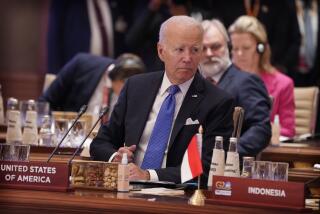The Next Move Is Pakistan’s
- Share via
President Clinton’s visit to South Asia last week provided fresh evidence of Washington’s seesaw relationships there, with India moving up and Pakistan down. The trip produced little if any reduction in tensions between two nuclear-capable neighbors, but the candor was refreshing.
Clinton told top leaders of both countries that their nuclear tests of two years ago should not make them feel safer. In response, India’s figurehead president--the real power lies with the prime minister--lectured the American president for saying South Asia is the most dangerous place on Earth.
It’s true the world has plenty of flashpoints, but India should realize the legitimate fears of other nations about the tensions on the subcontinent.
As for Pakistan, Gen. Pervez Musharraf, the general who trashed democracy last October and refuses to give a timetable to return to civilian rule, claimed to be open to meeting with Indian leaders. But he has added a condition that he knows New Delhi will find unacceptable: India would have to ask for a meeting first. That’s not the way to move toward peace, especially given the Pakistani army’s continued assistance to guerrillas fighting in mostly Indian-controlled Kashmir, a region claimed by both nations.
Clinton’s trip should be an impetus for improving relations between the U.S. and India, two countries suspicious of each other for far too long. The Cold War between the superpowers of the Northern Hemisphere has long since disappeared, and it’s time for New Delhi and Washington to think anew about old alliances. India was close to the Soviet Union, a nation that no longer exists. Washington should take advantage of the changes in politics and economic orientation in India, which now has opened to foreign investment.
Clinton spent four days in India, and not much longer than four hours in Pakistan. That was appropriate. His visit to Islamabad did nothing to legitimize the army takeover of last October, even if Musharraf chooses to interpret it that way.
Unlike the United States and the Soviet Union during the decades of nuclear standoff, India and Pakistan share a common border and have few institutional safeguards against nuclear combat. They have fought three wars in the past 53 years.
Now Pakistan needs to rein in the terrorists crossing into Indian Kashmir and should move instead to provide a firm economic and political footing for an end to military rule. Then it should resume talks with India for a lasting peace.
More to Read
Sign up for Essential California
The most important California stories and recommendations in your inbox every morning.
You may occasionally receive promotional content from the Los Angeles Times.










